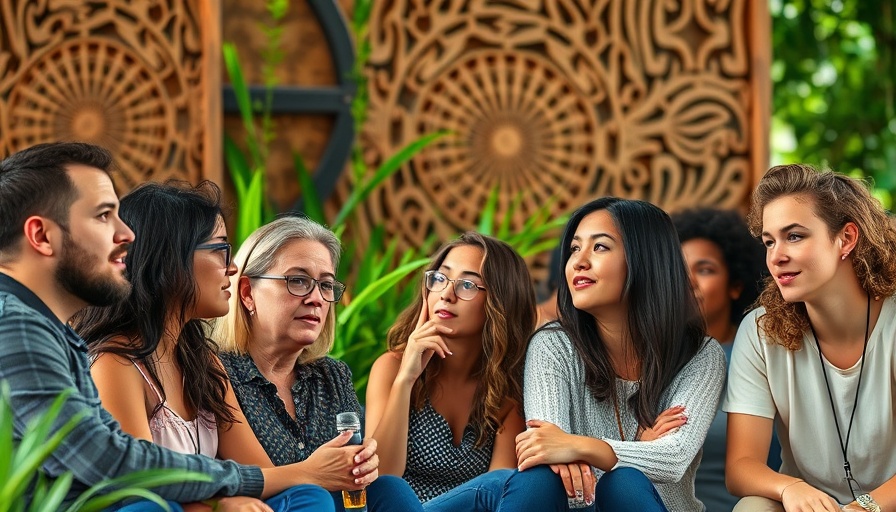
Understanding Mercy and Community Through Muslim Youth Voices
In the heart of a bustling world, where diverse cultures converge, the voices of Muslim youth offer profound insights into two essential pillars: mercy and community care. These discussions not only highlight their individual experiences but also illuminate the universal values that can bridge cultural divides.
In "Muslim Youth Perspectives on Mercy and Community Care," the discussion dives into vital cultural insights, exploring key ideas that spark deeper analysis on our end.
The Value of Community Care
One of the compelling themes from the video "Muslim Youth Perspectives on Mercy and Community Care" is the emphasis on community as a crucial component of well-being. For many Muslim youths, the concept of 'Ummah'—the community—plays a significant role in their lives, guiding their actions and interactions. They express a strong desire to give back to society, engage in charitable activities, and provide support for those in need.
This sense of obligation doesn't merely end at immediate family; it extends to neighbors, friends, and even strangers. Acts of mercy, whether through volunteering at local shelters or participating in community clean-up events, reflect their commitment to nurturing a supportive network. This dedication allows individuals to connect over shared values and foster a culture of kindness.
Mercy: A Cornerstone of Identity
Throughout the discussions in the video, mercy emerges as a defining characteristic of Muslim identity. For these young people, mercy is not simply an abstract idea but a practical guideline to live by. It transforms how they approach life’s challenges and influences their responses to societal issues, particularly in times of crisis.
Many shared personal stories of how they were nurtured within a compassionate environment, reinforcing the notion that mercy is taught through both words and actions at home. This cultural foundation empowers them to reach out to others in their communities, creating a ripple effect that nurtures inclusivity and empathy.
Cultural Holidays as a Reflection of Values
Holiday celebrations serve as important touchpoints for showcasing mercy and community. The collective observance of holidays such as Eid provides Muslim youth with opportunities to gather and reflect on their values. These gatherings often involve charitable acts, ensuring that during festive seasons, the spirit of giving remains alive.
For families and educators, understanding these cultural holidays can enhance the sense of belonging for Muslim youth. Celebrations that emphasize sharing, compassion, and community bonding serve as pivotal moments for fostering intergenerational relationships, ultimately creating a supportive environment for children to thrive.
Empowering the Next Generation
Our engagement with the perspectives of Muslim youth highlights a promising vision for the future. By encouraging them to lead initiatives that promote mercy and community care, society benefits from their distinct viewpoints and actions. Programs can be developed that allow young people to take charge, mentoring them to become advocates for positive change.
Florida has seen recent strides in this area, where community programs focus on empowering youth as leaders. These initiatives not only serve to bridge cultural gaps but also reinforce the importance of becoming active contributors in their communities.
Inspiring Action Through Awareness
Understanding the values that guide Muslim youth leads to a broader discussion about social issues facing today's landscape. For parents, educators, and travel enthusiasts, recognizing the significance of mercy and community care in shaping our culture is vital. Engaging with diverse viewpoints, such as those expressed in the video, encourages critical thinking and empathy.
Participating in community events, exploring cultural holiday travel options, or engaging with local organizations that promote inclusiveness can empower individuals to contribute to societal progress. This is particularly relevant for those planning their cultural holidays in December, where the spirit of giving and community is often emphasized.
Final Thoughts: The Role of Cultural Values in Travel
In conclusion, the perspectives shared by Muslim youth serve as a compelling reminder of the importance of mercy and community care. Their voices resonate well beyond cultural boundaries, inspiring many, including parents, educators, and travel enthusiasts, to incorporate these values into their lives. As we explore ways to travel meaningfully, we can apply these insights to free our journeys from mere sightseeing to genuine cultural engagement—where mercy and community thrive.
Thus, as we immerse ourselves in cultural holidays and consider how they connect us to deeper values, let’s take a moment to ponder how our actions—big or small—can contribute to a more compassionate society.
 Add Row
Add Row  Add
Add 




 Add Row
Add Row  Add
Add 

Write A Comment